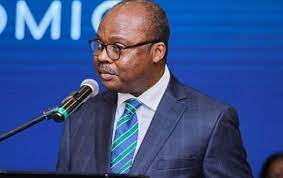The European Central Bank (ECB) in a podcast published on February 23, 2023, has explained the sources of central bank profits and losses, and whether it did matter whether central banks made a profit or loss.
The release, which was done after the ECB had released its financial statement for the year ended 2022, stressed on the primacy of central bank’s mandate of keeping prices low, hence, are not expected to negate this role and avoid losses in order to report handsome profit.
“In today's difficult economic environment central banks across the world are either making or warning of losses. It's important to remember though that central banks are not like ordinary companies; they can lose money and still operate effectively” the podcast stated. Even though the conversation was on where profits and losses could come from in the context of the ECB and the central banks in the 20 countries using the Euro, it provided insightful information that explained how and why central banks globally incure losses.
“A central bank doesn't work towards making a profit. It mandate is actually to keep prices stable”, the podcast revealed.
“We are a public institution and like an ordinary company we can make profits and losses but making profits or avoiding losses at all costs is not our aim, our aim is to keep prices stable”, the podcast explained, further stressing that profit is “basically a by-product of what we do, of our mandate”.
Analysing the composition of cost to the ECB, the podcast explained that “when banks deposit money with us, and banks do deposit money with us because they have accounts with us just like citizens have accounts with commercial Banks, commercial banks have accounts with the Euro system and we pay interest rate on these deposits and that's, I would say, the biggest source of costs”.
The ECB sets three interest rates, and one of them is the deposit facility rate, at which rate the ECB pays interest to the banks. This is similar to the cost of open market operations that some central banks use to mop excess liquidity from the economy.
“These losses that we've seen this year have been down to different things, some of them a little bit more tricky to explain than others, but this last point that we talked about, the interest rates, this is key here because they're closely linked to some of those losses. I just want to zoom out a second to look at the economic environment that we're in right now because it's also important. Inflation is high and we are raising our key interest rates to tackle that including the deposit facility”, the ECB explained.
It may be recalled that the Bank of Ghana released its Annual Report and Financial Statements just a few weeks back, depicting a cost of GH¢8.3 billion on its open market operations to tame inflation. This cost incurred has proved significant, as the mopping up exercise contributed to the reduction of inflation by more than 30 percentage points, from a high of 54.1% at the end of December 2022 to 23.2 % at the end of December 2023.
The Bank of Ghana has further explained that keeping inflation low and stable was a precondition for economic growth and that within a floating exchange rate regime it also contributes to exchange rate stability. The Bank of Ghana’s medium-term inflation target is 8%, however, the central bank accepts fluctuations of plus/minus 2% of this target.
Latest Stories
-
Putin says Russia will use new missile again in ‘combat conditions’
2 hours -
We have rescued kidnapped Emirates Airlines Airport Services Manager – Police
2 hours -
Bawumia-branded campaign vehicle burns, occupants escape unscathed
2 hours -
Bawumia, thousands observe ‘Jummah’ prayers as new Walewale Central Mosque is commissioned
3 hours -
Peasant farmers hail Bawumia as Walewale Watermelon Factory is commissioned
3 hours -
Joy FM Prayer Summit for Peace ends in electrifying worship and prayer
10 hours -
The Conscience of Leadership: A call to President Akufo-Addo on Ghana’s environmental devastation
11 hours -
Ghanaian youth unaware of their right to hold politicians accountable – Youth Bridge Foundation
12 hours -
Judge delays Trump sentencing for a third time
12 hours -
2024 WAFCON: Ghana drawn against defending champions South Africa in Group C
13 hours -
Photos from DW-JoyNews street debate on ‘galamsey’
13 hours -
Mimmy Yeboah: Blending heritage with global sophistication, confidence redefined through couture
14 hours -
100 Most Influential People Awards 2024: Brain Hill International School’s Director Mary Anane Awuku honoured
14 hours -
Akufo-Addo commissions 97-km Tema-Mpakadan railway line
14 hours -
Majority requests recall of Parliament
14 hours

